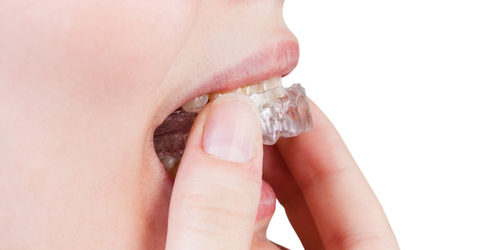Bruxism is also known as night grinding and it is an involuntary activity that people experience, at any time of day but often when they are asleep at night, thus the name. It is characterized as the exhibiting over-activity of the muscles of mastication so there is clenching or grinding of the teeth, with some cases more severe than others.
Some cases of bruxism are localized effects on the anterior teeth or the posterior teeth only; but some cases are more severe and may affect all teeth. Depending on intensity and frequency, the effects will vary and many of these cases go unnoticed unless wear facets have been detected by the dentist or a sleeping companion begins to complain of the nightly disturbance.
More than the Sound
Sleeping companions and the actual bruxers, themselves, are awakened in the middle of the night because the horrific sounds of night grinding. Especially when the grinding is toot intense, it can truly be a nuisance; but more than the sound it makes, attention is given to these cases because it can lead to these complications:
1. Tooth damage. The direct effect of bruxism is tooth damage. Constant grinding and clenching will cause a wearing away of tissues so the teeth will appear abraded and worn.
2. Tooth sensitivity. As the teeth get further abraded, the outer layers of the teeth are abraded, so that the inner layers of the teeth are exposed. The pulp tissue which is also known as the “nerve tissue” of the tooth is located in the middle chamber and with the continuous wearing away of the teeth, this gets exposed, causing sensitivity.
3. Bite changes. A long-time consequence of night grinding is a change in bite. As the tissues continue to wear away, the bite collapses and shift.
4. Loss of facial integrity. When the teeth surface breakdown and get worn, the normal bite collapses. This may not seem so much, but you have to understand that the facial tissues rely on the integrity of the bite to maintain its youthful tautness. Have you not seen an old person without his dentures? The teeth give us a youthful appearance and when the bite collapses, facial integrity is compromised.
5. Joint problems. The most severe and problematic consequence of prolonged and unresolved night grinding is the development of joint problems. This may be characterized by jaw pain, clicking, popping and locking of the jaw, difficulty of opening and closing, as well as swelling.
To this day, there is no truly effective cure for night grinding, but its damaging effects may be prevented by the wearing of a night guard or mouth guard. There is no true way to stop the activity, so the only thing you can do is to provide some kind of cushion to protect the teeth from further damage. The guard is worn nightly, to counter the overactivity of the muscles, and they are replaced when the appliance is already worn. Now, note that while there are guards that may be bought ready-made from sports stores, you should only trust a laboratory fabricated guard prescribed by the dentist. It is made to fit your teeth and jaw, so it is comfortable and it won’t bring about unwanted complications.








